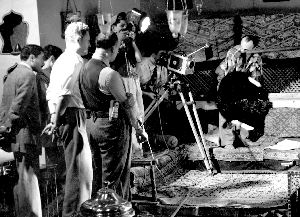Nâzım and Cinema
Oğuz Makal

“Nâzım is not only a great Turkish poet and a play writer;
he is also a unique scenarist and director…”
Cinema In His Poems
Let us clarify that first; there is uniqueness and dynamism in his work that no one else has: Well, what is that? Superiority of vision and observation; the high-level capacity… Let us start from here: Nâzım Hikmet acquired the talent of “the power of ‘sight’” , his point of view in former Soviet Union where his political view and ideology were shaped. Nâzım Hikmet’s poem titled “Açların Gözbebekleri” (Pupils of the Hungry) was composed after his watching a documentary “Hunger…hunger…hunger…” In addition to its narrative, the poem has similarities with visual and cinematographic elements not only with the orderly structure but also the way “words” are employed and there are more poems that carry on these features… In his twenties as well, Nâzım had an unprecedented creativity, a courageous, fearless vision/observation depth and he conserved that unique characteristics till his death.
His first significant poem “Benerci Kendini Niçin Öldürdü?” (Why did Benerci killed himself?) which was embellished with the elements of vision/observation was not made into a movie yet this poem is just like a surrealist film text that follows the surrealism trend initiated by Luis Bunuel and Salvador Dali in those years.
In his epic poem „Memleketimden İnsan Manzaraları”(Human Views from My Hometown) and “Saman Sarısı”(Straw Yellow) which is one of his last poems, Nâzım commonly makes use of cinematographic elements. His close friend and writer Ekber Babayev states that in these poems Nâzım employs the cinema techniques of narrative and fiction widely.
Cinema Adventure
In the days of 1932 when Nâzım was undergoing troubles with the Communist Party of Turkey and also suffering the loss of his father, the pioneer of Turkish theatre Muhsin Ertuğrul paid a visit to Nâzım and asked him to write a few plays since he knew well Nazım’s writing talent. Nâzım composed Kafatası (Skull) and Bir Ölü Evi (House of a Dead Person) plays for him. Following that, upon Ertuğrul’s will he worked as a directing assistant in taking Bir Millet Uyanıyor (A Nation is Waking) film which is about the story of Turkish Independence War.
From that point onwards, Nâzım was engaged with scenario writing and also working in İpek Film sound recording company from (8 July 1933) till 1938 when he was put into prison. During that time under the nickname of Mümtaz Osman , he wrote the scenarios for operetta movies “Karım Beni Aldatırsa” (If My Wife Cheats On Me) “Söz Bir Allah Bir” (1933) (One Word One God) and “Cici Berber” (Cute Barber)(1933) which were all written by Muhsin Ertuğrul.
 Türkçe
Türkçe  ENGLISH
ENGLISH  Español
Español  Русский
Русский 

